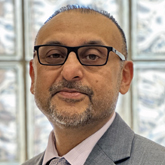By Cristina D’Imperio
 Satdarshan (Paul) Singh Monga, MD, Director of McGowan’s Cellular Approaches to Tissue Engineering and Regeneration (CATER) Training Program and Founding Director of the National Institutes of Health (NIH), National Institute of Diabetes and Digestive and Kidney Diseases (NIDDK)-funded Pittsburgh Liver Research Center (PLRC), discusses a new medication to help liver regeneration in The Conversation.
Satdarshan (Paul) Singh Monga, MD, Director of McGowan’s Cellular Approaches to Tissue Engineering and Regeneration (CATER) Training Program and Founding Director of the National Institutes of Health (NIH), National Institute of Diabetes and Digestive and Kidney Diseases (NIDDK)-funded Pittsburgh Liver Research Center (PLRC), discusses a new medication to help liver regeneration in The Conversation.
While the liver has the ability to regenerate, damage from alcohol abuse, obesity, and medications can cause the liver to fail. Dr. Monga notes, “Because very few effective treatments are available for illnesses like nonalcoholic fatty liver disease and alcoholic liver disease, many patients worsen and end up needing a liver transplant.”
In 2022, more than 9,528 liver transplant surgeries were performed in the U.S.; however, as of October 2023, there are 10,050 people currently on the liver transplant waitlist. Patients can wait anywhere from 30 days to five years to receive a liver transplant.
Reenabling the liver’s ability to regenerate has the potential to alleviate the need for transplantation.
Dr. Monga and his team found “that activating a particular protein with a new medication can help accelerate regeneration and repair after severe liver injury or partial surgical removal in mice.”
“One way to address liver transplantation shortages is to improve treatments for liver diseases,” continued Dr. Monga. “My team and I believe that improving the liver’s ability to repair itself could help circumvent the need for transplantation. Further study of drugs that promote liver regeneration may help curb the burden of liver disease worldwide.”
Read the full article from The Conversation here.
